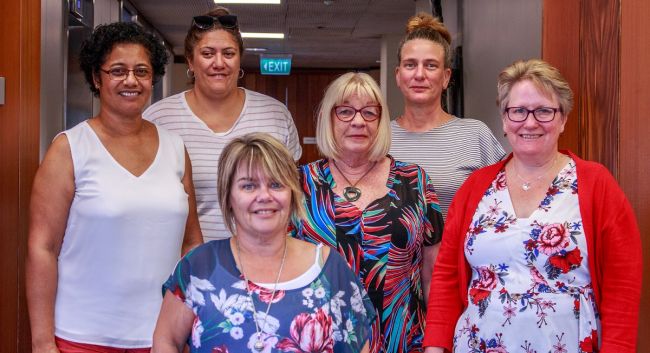Nouvelle-Zélande : augmentation historique de l’équité salariale pour les personnels de soutien de l’éducation
Cette offre fait suite à un processus d’équité salariale que NZEI Te Riu Roa a négocié avec le Ministère de l’Éducation en 2016. L’accord salarial, qui est antidaté au 12 février, est le plus important accord d’équité salariale depuis celui de 2017 pour 55.000 aides-soignant·e·s.
Si l’on ajoute à cela les augmentations du salaire de subsistance obtenues lors des négociations collectives fin 2019, la plupart des aides-enseignant·e·s sont désormais en mesure de recevoir des augmentations de salaire de 23 à 34 % en 2020, soit une augmentation de 4 dollars néo-zélandais (2,20 euros) à 6,60 dollars néo-zélandais (3,80 euros) de l’heure. Cette mesure reconnaît la valeur des compétences, des responsabilités et de l’expérience des aides-enseignant·e·s, qui ont été sous-estimé·e·s en raison de leur genre. Les écoles seront également financées pour payer les taux majorés.
Dans les semaines à venir, tou·te·s les aides-enseignant·e·s auront l’occasion de discuter des détails avant de voter en ligne pour approuver l’accord.
NZEI Te Riu Roa : une grande victoire pour les aides-enseignant·e·s et les femmes
Liam Rutherford, Président de NZEI Te Riu Roa — un affilié de l’IE — a souligné que l’accord proposé est une grande victoire pour les aides-enseignant·e·s et pour les femmes. « Les preuves de ce processus ont été frappantes et ont confirmé ce que nous savions déjà — les aides-enseignants ont été considérablement sous-évalués et sous-payés pendant des décennies parce que ce sont majoritairement des femmes. Cette proposition d’accord permettra enfin de rémunérer équitablement les aides-enseignants et de reconnaître leur valeur. »
Il a ajouté qu’il était confiant que « cet accord ouvre également la voie à des accords d’équité salariale pour d’autres groupes de personnels de soutien, tels que les administrateurs et administratrices et les Kaiārahi i te Reo — assistants et assistantes d’éducation spécialisée — et pour lesquels nous souhaitons réaliser des progrès le plus rapidement possible ».
Nouvelle matrice de classification des emplois
Après un vote ouvert à tou·te·s les aides-enseignant·e·s pour approuver l’accord, les personnels de soutien membres de NZEI Te Riu votera ensuite pour modifier sa convention collective afin d’y intégrer l’accord. Ensuite, tou·te·s les aides-enseignant·e·s seront transféré·e·s à une nouvelle échelle de rémunération basée sur une nouvelle matrice de classification du travail.
Les membres de NZEI Te Riu Roa pourront avoir accès au soutien de leur syndicat et aux ateliers pour s’assurer qu’il·elle·s sont au bon niveau.
Tou·te·s les aides-enseignant·e·s commenceront à bénéficier des nouveaux taux de rémunération à partir de novembre 2020, avec effet rétroactif au 12 février 2020.
Outre les augmentations de salaire, l’accord proposé modifie la manière dont les compétences sont évaluées, prévoit une allocation Tiaki (anciennement appelée allocation « travail sale ») plus flexible et plus élevée, modifie la quantité d’heures pouvant être variée et augmente le financement de la formation et du développement professionnels. Un engagement a également été pris pour étudier le financement central, le recours aux contrats à durée déterminée et le développement des parcours professionnels.
New Zealand Herald : un pas important
Le quotidien « New Zealand Herald » a souligné que « l’accord, qui coûte environ 70 millions de dollars par an, transformera le métier d’aides-enseignants, un groupe précaire payé pour l’essentiel uniquement au salaire minimum, en une profession attrayante, dont le salaire débutera à 88 % de celui d’un enseignant débutant formé ».
Il a déclaré que cette victoire représente un pas important vers la réduction de l’écart persistant de 11 % entre les salaires horaires moyens des hommes et des femmes en Nouvelle-Zélande. Le journal a cité des exemples, tels que les gardien·ne·s de prison, qui sont principalement des hommes et dont le salaire de départ est de 53.444 dollars néo-zélandais. Ce salaire est 44 % plus élevé que celui des aides-enseignant·e·s, qui sont à 86 % des femmes. Les aides-enseignant·e·s n’ont commencé à recevoir le salaire minimum que fin 2019. Cet accord d’équité salariale fera passer le salaire de départ des aides-enseignant·e·s de 17,70 dollars néo-zélandais (1,10 €) à 21,20 dollars néo-zélandais (12,10 €) de l’heure, soit 44.096 dollars néo-zélandais (25.248 €) pour un poste à plein temps. Il s’agit d’un progrès substantiel, même s’il est encore inférieur de 21 % au salaire de départ d’un·e gardien·ne de prison.

[Wed, 03 Jun 2020 19:56:00 +0000] | DIGG THIS
